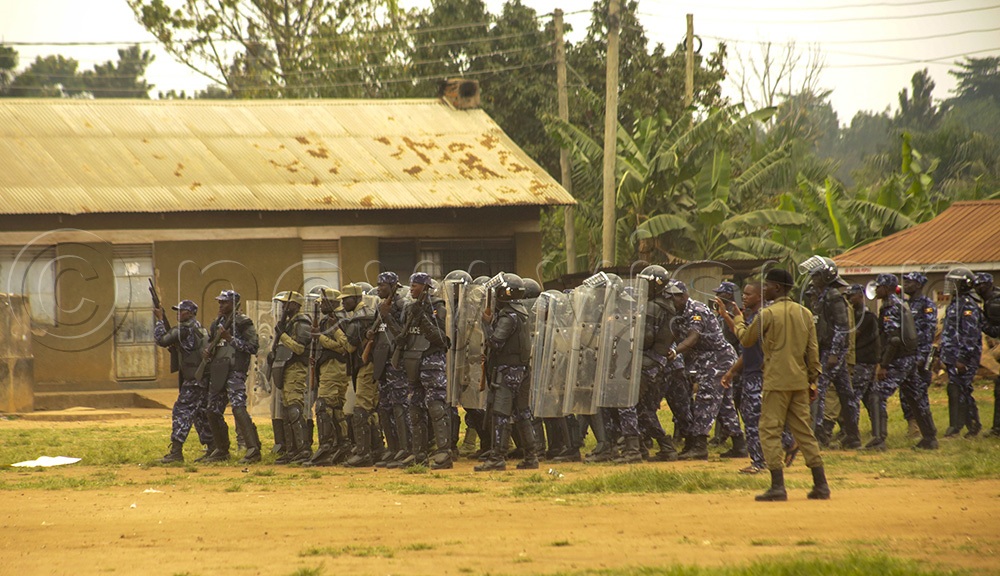2026 polls: Elgon Police display human rights-compliant riot control skills
“Our duty is to ensure safety and security without infringing on the rights of citizens, notably during electioneering. Professionalism grounded in respect for human rights must guide all our actions, Asiimwe stressed.
Trainers guided police officers on lawful arrest procedures and dialogue-led approaches to crowd management. (Credit: Javier Silas Omagor)
With the 2026 General Election drawing closer, the Elgon Regional Police have rolled out a comprehensive training programme to equip its officers with the skills to manage violent crowds, while upholding human rights.
The training was opened by region Police commander Samuel Asiimwe, who told officers that protecting citizens' rights must remain central to their work even when confronted with hostile situations.
“Our duty is to ensure safety and security without infringing on the rights of citizens, notably during electioneering. Professionalism grounded in respect for human rights must guide all our actions, Asiimwe stressed.
Officers were taken through a wide range of practical and theoretical sessions. They learnt crowd control techniques such as motorcade management, the lawful use of teargas and rubber bullets, dialogue and de-escalation, and proper arrest procedures.
Trainers also emphasised the laws and policies governing elections, reminding participants that every decision taken on the frontline must reflect both legality and restraint.
Beyond riot management, the officers were prepared for situations that may demand investigative and humanitarian responses.
They were trained in handling political cases, administering first aid, and collecting credible evidence that can stand legal scrutiny.
Special sessions were also conducted on officer safety while on duty, highlighting the need for discipline, personal responsibility, and coordination in high-pressure environments.
Dialogue over confrontation
Lead trainer David Mugisha, underscored the importance of dialogue over confrontation.
“Dialogue should always be the first option.”
Force must be lawful, proportional, and the very last resort,” Mugisha explained, urging officers to focus on mediation and conversation to defuse political tensions before they escalate into violence.
A highlight of the training was the live demonstration, which drew large crowds of Mbale residents eager to observe their police at work.
Police officers demonstrate riot control drills using shields and rubber bullets while simulating violent crowds. (Credit: Javier Silas Omagor)
In one exercise, officers fired rubber bullets and live rounds in the air as they engaged with fellow soldiers acting as violent political demonstrators.
The carefully choreographed drills impressed the public, who applauded the officers’ professionalism and discipline.
The demonstrations also included simulations of first aid delivery and media coordination.
A group of trainees managed communication and press briefings, while another was tasked with rescuing the injured and providing medical care on site.
The exercise reinforced the message that effective policing requires not only force but also communication, transparency, and care for human life.
Sister security agencies, including the Uganda People's Defence Forces (UPDF), Uganda Prisons Services, and Uganda Wildlife Authority (UWA), also attended the capacity building training.
This inter-agency approach was praised by the commanders who said it would improve joint operations during the coveted heated political season.
Community leaders and academics welcomed the move, noting that violent confrontations between security agencies and opposition supporters have often marred past elections in Uganda.
George Manana, a former lecturer at Livingstone International University, argued that the exercises was timely.
“Proper crowd control that respects citizens’ rights can significantly reduce election violence and improve public confidence in law enforcement,” he observed.
John Khauka of LivingStone International University echoed the same, saying the training showed proactive leadership.
"These steps are vital. Without firm leadership and continuous training, election violence becomes a self-fulfilling prophecy," he noted.
Ordinary residents in Mbale said they were encouraged by the transparency of the exercise.
Innocent Diba, a political analyst, said watching officers perform with discipline gave her confidence that tensions would not be unnecessarily escalated during the campaigns.
Mike Atwooki, a bodaboda rider, added that knowing officers were being trained in human rights made the public trust them more.
As the election season approaches, the Elgon Regional Police hope the skills imparted will translate into field discipline and professionalism.
With emphasis on human rights, dialogue, and coordinated responses, the training has raised expectations that the 2026 elections in Mbale and across the Elgon region will be peaceful, orderly, and credible.